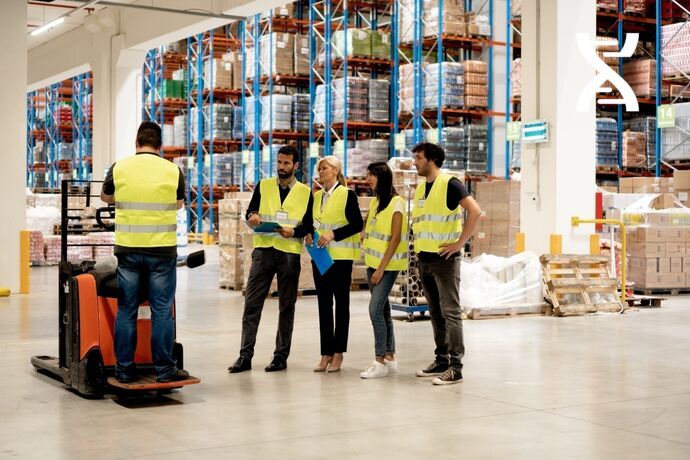A job-creating sector
Key figures for the logistics and transport sector
The development of e-commerce, the internationalization of trade and new consumer habits have all contributed to strengthening the position of the logistics and transport sector within the French economy. Here are a few figures to give you a better idea of the unprecedented growth of this sector.
Logistics and transport currently account for over 1.9 million jobs in France, in fields as varied as industry, commerce, trade, hospitals, humanitarian aid and the military. This is equivalent to around 10% of all jobs in the commercial sector, excluding temping. According to the latest report published by Pôle Emploi, the sector is set to expand rapidly over the next few years, with 540,000 new positions to be filled by 2022. These new hires will involve a wide range of profiles. So, whatever your educational background or level of qualification, in the coming years it will probably be easier than ever to make a career in logistics and transport
Geographically, the Île-de-France region is currently the main source of jobs in the sector, accounting for around 20% of recruitment. However, other regions remain particularly attractive in economic terms, notably Auvergne-Rhône-Alpes (13%) and Hauts-de-France (10%).
Little-known logistics and transport professions
Well-known to the general public, delivery drivers and warehousemen are only the tip of the iceberg. In fact, the transport-logistics sector offers a wide range of professions, from materials handling to strategic decision-making, marketing and IT. In all, more than 150 professions, including some 40 specific to the sector, are currently listed. All offer real job opportunities. Here are just a few of them, accessible after a DUT, a professional license, a sandwich course or a master's degree. If you're interested in any of them, please contact the appropriate organization The forklift operator's main task is to manage merchandise inventories. He/she manages the arrival of products and ensures their conformity, unloads goods, stores them and prepares them for dispatch. Multi-skilled, the forklift operator must be able to cope with sustained rhythms due to the high seasonality of orders.
Supervising the supply chain, the logistics manager is responsible for ensuring constant product availability. He or she is also responsible for optimizing procedures and reducing delivery times.
The logistics coordinator acts as an interface between the various departments and service providers involved in the supply chain. He or she is responsible for the smooth flow of goods between the various levels of the supply chain. Their main objectives are to optimize costs, reduce lead times and ensure customer satisfaction
Loading, driving, engineering, marketing and customer service are also integral parts of the transport-logistics sector.
Focus on the Covid 19 crisis
The health crisis linked to the Covid-19 pandemic has done much to reinforce the role played by e-commerce and logistics in the French economy. Since March 2020, many traditional stores have had to expand their online sales activities. Major retailers have been urged to review their strategies in order to better respond to increasingly demanding consumer requirements The health crisis has highlighted the need for companies to take even greater control of logistics issues, particularly from an environmental and urban point of view. Today, it's not just a question of meeting growing delivery demands, but also of limiting the carbon impact of logistics and transport, in particular by optimizing delivery routes.
As demonstrated by the mask supply crisis at the start of the pandemic, the current context also highlights the importance of rethinking the territorial organization of trade. The relocation of certain factories and warehouses within Europe will necessarily contribute to the short-term reinvention of supply chain models. New talents will undoubtedly have a role to play in this.
The feminization of the sector
Contrary to popular belief, women play an important role in the transport and logistics sector, today accounting for around 18% of the workforce. The majority of them work in support functions, such as IT, human resources, purchasing and sales, or customer relations. Women accounted for just 14% of the total workforce in 2005. Their presence in a sector reputed to be male-dominated is therefore increasingly felt!
Conversely, women are still under-represented in operational professions, which are often characterized by high levels of physical exertion. There are just 13% women in passenger transport and 4% in road haulage. In maintenance services, 94% of employees are men.
In the years to come, however, the shortage of manpower in this specific sector and the evolution of logistics technologies could help reverse this trend. Keen to give everyone an equal chance, several professional bodies have recently launched wide-ranging programs to make transport jobs more attractive to women. One example is the "Itinéraire égalité" program set up by AFP, the Association pour le développement de la formation professionnelle Transport et Logistique.






